Kyrgyz Doodle moved to town,
Ended his life as a yurter,
Put a potato chip in his doner kebab
And called it a gamburger.
Sunday, September 30, 2007
Barf's Got Competition
Attention, consumers! Barf, the Iranian detergent brand that means "snow" in Farsi, has come out with its own hand soap.

Now your clothes and your hands can be pure as the fresh-fallen Barf. But why did the company choose recently to expand its product line? My hypothesis is that diversification is a strategy of survival as Barf faces a tough new competitor on the detergent market:
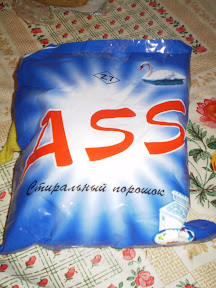
Now your clothes and your hands can be pure as the fresh-fallen Barf. But why did the company choose recently to expand its product line? My hypothesis is that diversification is a strategy of survival as Barf faces a tough new competitor on the detergent market:
Saturday, September 29, 2007
Harasho Masheenas

Caspian Scene, an English-language magazine we picked up in Baku, had a lot of useful information on the city's dining scene, but other than that it was essentially the sounding board for a lady named Sandra Cummming. Sandra wrote almost every article in the magazine, and displayed encyclopedic knowledge. One was about the possible Caucasus origins of the Norse people. Ever wonder why they have a god called Aser? Hm? Or why white people are called Caucasian? Another article was on Russian car makes - the hardy UAZ, GAZ and KamAZ. Sandra refers to them collectively as “harasho masheenas,” a butchering of the Russian khoroshiye mashiny (good cars) that she apparently picked up from one of her many drivers.
"One essential feature of life in post-Soviet Central Asian countries is the existence of sturdy Russian vehicles," she writes. "These are best seen in action where life is sometimes tough with the terrain to match." Sing it, Sandy. We experienced this first-hand a couple weeks after reading the Collected Works of Sandra Cumming when traveling through the tough-as-nails Pamirs, where even the parts that are "paved" have potholes like craters.
The Toyota van we started out with Khorog became useless after reaching Alichur three grueling days into the four-day journey, and we had to get through the rest of Tajikistan and into Kyrgyzstan on a Lada and a Volga. I should note that both of these broke down on the road as well, but were up and runnning again after a few slaps and taps - not like Japanese cars, which require serious, sophisticated care from a professional to solve their problems. If only I could bring a Volga to the U.S. with me...
Stay Classy, Alichur
On our final day in the Pamirs, we met with disaster: our car broke down. Now, you might be asking yourself, what's the big deal? Just hire another car. If you did ask yourself that, you have never been to Alichur.
Alichur is about halfway between Khorog and Mugrab on the Pamir Highway. In other words, its in the middle of nowhere. When it started to become apparent that our car might not be fixed that day (and we couldn't wait around for it to be fixed, because my visa ran out the following day), we began to ask around about other transport. I was told by one man that we had best wait for out driver to fix the van, because cars don’t generally stop in Alichur, and the village itself had no vehicles in working order.
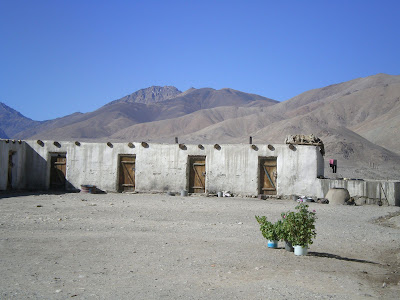 Downtown Alichur.
Downtown Alichur.
Rather than sit around and bemoan our lack of transport, we decided to take a little hike around the Pamirs. The Pamir Region of Tajikistan as also known by the locals as the “Roof of the World.” Alichur’s elevation is around 4000m, and supposedly the plain surrounding it is one of the most fertile in the Pamirs, but it still looked rather barren to us. The entire Pamir region is extremely poor, and Alichur seemed to be no exception. One of the men explained to us that the reason the village didn’t have electricity is that years ago someone had stolen all the copper wire to sell for scrap. Most of the men go to Moscow to work – in fact, almost every man we talked to had just come back from or was just leaving for Russia. Ever the capitalists, after hiking up one of the hills outside of town we contemplated how Alichur could boost its economy. We began by brainstorming their natural resources, but only got as far as rocks and mountains. Other than mountain tourism and stone masonry, we were at a loss for how Alichur could market itself in the 21st Century.
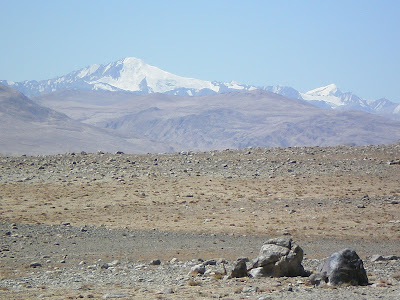
Rocks and Mountains.
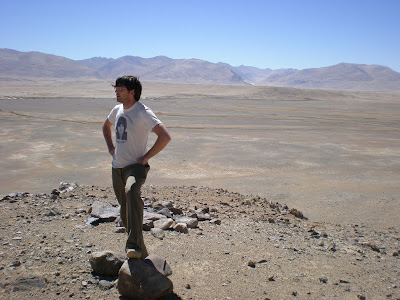
On the Roof of the World!
Despite their isolation, the people in Alichur were amazingly kind and welcoming. While they told us they see about one group of tourists a day pass through during the summer, we were told by one man that we were the first Russophone tourists they had ever met, so we were a big hit around town. As I sat around assessing the progress being made on our car, I was approached by the man who we would call The Boss, as it fast became clear that all decisions in Alichur had to pass by him. And with his stylish aviators and dapper sports coat, Alichur could have no finer boss man.
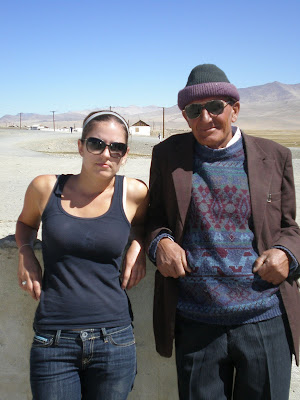 Me and The Boss.
Me and The Boss.
Later my eye was caught by the whimsical fashion choices of another man about town. He seemed to be the village hipster, and thus we dubbed him the Pamipster. While in retrospect it seems so obvious, we didn’t learn until later that evening that The Boss was the Pamipster’s father.
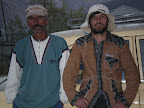
Driver Maksin and the Pamipster
Later in the afternoon, with there being no sign that the van would be fixed any time soon, the Pamipster and Maksin (a guy with a car) volunteered to take us to Murghab, where we could hop a shared van out of the country. After 30 minutes or so tinkering with their car and coaxing it into motion (including pushing it down a hill to get the engine started), the Pamipster and friend rolled by to pick us up and we said our good-byes to the wonderful people of Alichur.
Upon arriving in Murghab and finding us a suitably dodgy hotel, the Pamipster and Maksin went straight for the nearest store, returning with a bottle of vodka. We could think of no better ending to our day in Alichur.
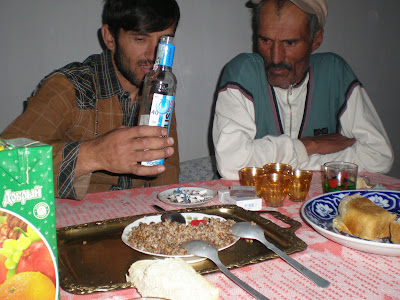
Only in a former Soviet republic could buckwheat count as a chaser.
Alichur is about halfway between Khorog and Mugrab on the Pamir Highway. In other words, its in the middle of nowhere. When it started to become apparent that our car might not be fixed that day (and we couldn't wait around for it to be fixed, because my visa ran out the following day), we began to ask around about other transport. I was told by one man that we had best wait for out driver to fix the van, because cars don’t generally stop in Alichur, and the village itself had no vehicles in working order.
Rather than sit around and bemoan our lack of transport, we decided to take a little hike around the Pamirs. The Pamir Region of Tajikistan as also known by the locals as the “Roof of the World.” Alichur’s elevation is around 4000m, and supposedly the plain surrounding it is one of the most fertile in the Pamirs, but it still looked rather barren to us. The entire Pamir region is extremely poor, and Alichur seemed to be no exception. One of the men explained to us that the reason the village didn’t have electricity is that years ago someone had stolen all the copper wire to sell for scrap. Most of the men go to Moscow to work – in fact, almost every man we talked to had just come back from or was just leaving for Russia. Ever the capitalists, after hiking up one of the hills outside of town we contemplated how Alichur could boost its economy. We began by brainstorming their natural resources, but only got as far as rocks and mountains. Other than mountain tourism and stone masonry, we were at a loss for how Alichur could market itself in the 21st Century.
Rocks and Mountains.
On the Roof of the World!
Despite their isolation, the people in Alichur were amazingly kind and welcoming. While they told us they see about one group of tourists a day pass through during the summer, we were told by one man that we were the first Russophone tourists they had ever met, so we were a big hit around town. As I sat around assessing the progress being made on our car, I was approached by the man who we would call The Boss, as it fast became clear that all decisions in Alichur had to pass by him. And with his stylish aviators and dapper sports coat, Alichur could have no finer boss man.
Later my eye was caught by the whimsical fashion choices of another man about town. He seemed to be the village hipster, and thus we dubbed him the Pamipster. While in retrospect it seems so obvious, we didn’t learn until later that evening that The Boss was the Pamipster’s father.
Driver Maksin and the Pamipster
Later in the afternoon, with there being no sign that the van would be fixed any time soon, the Pamipster and Maksin (a guy with a car) volunteered to take us to Murghab, where we could hop a shared van out of the country. After 30 minutes or so tinkering with their car and coaxing it into motion (including pushing it down a hill to get the engine started), the Pamipster and friend rolled by to pick us up and we said our good-byes to the wonderful people of Alichur.
Upon arriving in Murghab and finding us a suitably dodgy hotel, the Pamipster and Maksin went straight for the nearest store, returning with a bottle of vodka. We could think of no better ending to our day in Alichur.
Only in a former Soviet republic could buckwheat count as a chaser.
Grandpa Sass
One overnight stay in the Wakhan Vallery was in the village of Ptup, at the homestead of an old man whose tongue was so sharp we called him Grandpa Sass. He seemed to take great pleasure in ordering around Habib, our driver, and his two assistants, and engaged us in talks about politics. Like all Tajiks, he hates the Tajik president and had a few sassy comments about him. Then we talked a little about American politics, too, but here the sophistication of the discussion was limited by his small knowledge of how power changes hands in our nation.
"Do you want to assassinate Bush?" Grandpa Sass asked me.
"No, I can't do that!" I replied.
"If you hate him so much, kill him!" he said.
Maybe his understanding of the United States has been skewed by watching too many Steven Segal movies. After Grandpa Sass was done talking about how things were better under Brezhnev, we popped "Today You Die" into the DVD player, which must have been powered by some kind of generator because Ptup hasn't had electricity since the Soviet Union fell apart.

Sass' Choice
The next morning we were served a breakfast of bread and syrchoi, a milky, salty tea. For a heartier meal the guys from the van got a big can of gunky, congealed vegetable oil and spooned it into their bowls. Yellow slicks formed at the top. It made me a little queasy.
"Put some oil in your tea," Grandpa Sass commanded.
"No thanks," I said.
"They're doing it, so you have to do it too," he said. "This isn't America, this is the Soviet Union."
The al fresco dining room chez Sass
When Liz joined the table he came up with a slightly subtler form of persuasion. "You have to add oil to lube it up," he told Liz. "Otherwise the syrchoi won't work." Liz pantomimed adding a gob. Smart move.
Then it was time to say goodbye to Ptup and our sassy host.
The Manhattan of the Pamirs
From Khorog, we hired a car to take us through the Pamirs. Our driver, Habib, brought along two “helpers”, his brother and neighbor. With our hot Pamir ride sorted out, we began by detouring from the Pamir Highway to go through the Wakhan Valley, which lies on the border with Afghanistan.
 Our hot whip.
Our hot whip.
Along the way, we stopped in Ishkashim, Wakhan’s regional center. We headed straight for the bazaar, which consisted of a few stalls selling various plastic goods made in China and a couple of ladies selling bread. If we had only known then what lay ahead of us in the Pamirs, we would have relished the relative urbanity of Ishkashim. While we were waiting in the car for our driver, our car was swarmed by a school children. This must have tipped off a British man who was drinking with some locals across the street that there were fellow foreigners in town. He stumbled out to great us (note he was wasted and it was about 11:00 am), and we soon learned that he was an aid worker who lived somewhere on the Afghan side of river. Apparently he had come to Ishkashim over the weekend and had been stranded while waiting for the border to reopen, and he had been drinking ever since. I asked him what the Afghan side was like, to which he replied “Ishkashim is like downtown Manhattan compared to the rest of the region”. Brian and I had a good laugh at that, but only later would we realize the deep wisdom of that Brit’s slurred words.
 5th Ave., Tajik-style.
5th Ave., Tajik-style.
Right outside of Ishkashim, we visited Khakha fortress, which is now occupied by Tajik troops on border watch. As we approached, one of the young guards was sent racing down the hill to great us and accompany us around. When I told him we were American, he asked to have his picture taken with Brian.
 Khakha Fortress
Khakha Fortress
 View of the Whakan Valley.
View of the Whakan Valley.

We're watching you, Osama
 Our hot whip.
Our hot whip.Along the way, we stopped in Ishkashim, Wakhan’s regional center. We headed straight for the bazaar, which consisted of a few stalls selling various plastic goods made in China and a couple of ladies selling bread. If we had only known then what lay ahead of us in the Pamirs, we would have relished the relative urbanity of Ishkashim. While we were waiting in the car for our driver, our car was swarmed by a school children. This must have tipped off a British man who was drinking with some locals across the street that there were fellow foreigners in town. He stumbled out to great us (note he was wasted and it was about 11:00 am), and we soon learned that he was an aid worker who lived somewhere on the Afghan side of river. Apparently he had come to Ishkashim over the weekend and had been stranded while waiting for the border to reopen, and he had been drinking ever since. I asked him what the Afghan side was like, to which he replied “Ishkashim is like downtown Manhattan compared to the rest of the region”. Brian and I had a good laugh at that, but only later would we realize the deep wisdom of that Brit’s slurred words.
 5th Ave., Tajik-style.
5th Ave., Tajik-style. Right outside of Ishkashim, we visited Khakha fortress, which is now occupied by Tajik troops on border watch. As we approached, one of the young guards was sent racing down the hill to great us and accompany us around. When I told him we were American, he asked to have his picture taken with Brian.
 Khakha Fortress
Khakha Fortress View of the Whakan Valley.
View of the Whakan Valley. 
We're watching you, Osama
Monday, September 17, 2007
Jet-setting in the Taj
From Dushanbe, we hopped a flight to Khorog, our jumping off point for trekking in the Pamir Mountains. We bought tickets to fly out on a Sunday, only to show up at the appointed time to be told the flight was cancelled because we were the only ones who had purchased tickets on the flight. So this, coupled with our previous dealings with the airline, made us a bit cautious about the, shall we say, consistancy of Taj Air's domestic flights, this route in particular because it requires the pilot to fly dangerously close to the rocky Pamir peaks as he navigates the narrow mountain passes. But we were comforted by LP's sidebar that the Dushanbe-Khorog flight had only gone down once in recent memory, and then only because of an errant missle from Afghanistan. No worries indeed! After an exhilerating 45 minute flight in a Russian-made Yak airliner, we touched down in Khorog, a pleasant mountain city nestled right againt the Afghan border.
 Ridin' dirty in the Yak.
Ridin' dirty in the Yak.

 The Pamirs in your face!
The Pamirs in your face!
 The passanger entrance also doubles as luggage hold.
The passanger entrance also doubles as luggage hold.
 From the tarmac you can hop a fence into Afghanistan. How edgy!
From the tarmac you can hop a fence into Afghanistan. How edgy!
 Welcome to Khorog.
Welcome to Khorog.
 Ridin' dirty in the Yak.
Ridin' dirty in the Yak.
 The Pamirs in your face!
The Pamirs in your face! The passanger entrance also doubles as luggage hold.
The passanger entrance also doubles as luggage hold.  From the tarmac you can hop a fence into Afghanistan. How edgy!
From the tarmac you can hop a fence into Afghanistan. How edgy! Welcome to Khorog.
Welcome to Khorog.
Hisssssar
Sunday, September 16, 2007
The Deaf and the (Sic) Man
While Tajik Air is short on some amenities that you would expect an airline to offer its customers (a reservation system, for instance), it does have its own in-flight magazine, with an assortment of articles in Russian, Tajik and English. My favorite was a piece on Rumi, the Persian mystic and poet who was born on the territory of modern-day Tajikistan 800 years ago. I offer an excerpt, with a big preemptive (sic):
In his short stories [Rumi] invites people to study and there is no better way for human than knowledge. Here below I tell you the story about deaf and a sick man in brief: Once a deaf man's beibour became ill, naturally the deaf man wanted to go and pay a visit to his neighbour So one day he thought to himself and prepared questions, simultenuously answers to his questions and went to see his ill neibour:
Deaf. Hello.
Sick. Hi.
D. How are you feeling? Are you going to be better?
S. No I feel myself worse and worse every day.
Deaf. Oh its wonderful.
D. Who is your doctor?
S. Azroil 1(According to islam a person who comes to dieing man and take his or her soul)
D,He is the best doctor.
What's your medicine?
S.Zahru zuqum (such fruit people eat in hell)
In his short stories [Rumi] invites people to study and there is no better way for human than knowledge. Here below I tell you the story about deaf and a sick man in brief: Once a deaf man's beibour became ill, naturally the deaf man wanted to go and pay a visit to his neighbour So one day he thought to himself and prepared questions, simultenuously answers to his questions and went to see his ill neibour:
Deaf. Hello.
Sick. Hi.
D. How are you feeling? Are you going to be better?
S. No I feel myself worse and worse every day.
Deaf. Oh its wonderful.
D. Who is your doctor?
S. Azroil 1(According to islam a person who comes to dieing man and take his or her soul)
D,He is the best doctor.
What's your medicine?
S.Zahru zuqum (such fruit people eat in hell)
Don't Worry, We're Still Alive
In case you frequent Blogistan readers are wondering why we haven't posted in a while, it's because we spent last week in the Pamir Mountains, where there is no Internet on account of there being no telephones or electricity. Or food or anything else. There will be plenty of stories about that coming soon, so hang in there.
Sunday, September 9, 2007
Our Own Little Speakeasy in Sharjah
Supposedly Sharjah is the dry emirate, meaning there is no airport bar from which to nab a pre-flight drink. However, we caught on to a little loophole in Sharjah’s prohibition law – staying true to its UAE duty-free zone roots, Sharjah International allows you to purchase liquor in the duty-free section, then drink it in any of the cafes after you pass passport control. Cheers, Sharjah!


Dushanbe: Town of Eastern Delicious Food

In their Central Asia guide book, the LP lists “Restaurants” as one of the “Must-Sees”. I laughed at first – surely the shout out to the restaurant scene must be less of an homage to Dushanbe’s culinary credentials than a nod to the fact that there is not much to see in the capital. As to the latter, its kind of true – Dushanbe is basically comprised of one long street running north to south. However , LP was right – Dushanbe may very well be the culinary capital of the CIS.
Exhibit 1- Deli Darbar
The entrepreneurial logic behind Deli Darbar is a bit unconventional: open reasonably priced Indian restaurants in war torn regions. In addition to Dushanbe, the DD has branches in Kabul and Mazar-e Sharif. Apparently civil strife is the perfect environment for the cultivation of a hopping ethnic food scene. We dined at the DD twice, and were impressed by the authenticity of each dish – even our New Zealand acquaintance of Indian descent gave it two samosas way up!
Exhibit 2 - Al Sham
Al Sham is no sham – it serves up great Lebanese food. I went there for dinner and had the hummus and falafel, which were among the best I’ve had outside of Lebanon.
Exhibit 3 – Salsa

While it might not live up to Pancho’s in Baku, Salsa, and Ecuadorian restaurant, satisfied out latin food cravings. Their signature dish is the llapingachos, fried potatoes and mozzarella cheese topped with peanut sauce. While the description made our stomachs turn, we ordered it any way, and did not regret it. The rest of the menu, a mix of Ecuadorian and Mexican dishes did not disappoint either.
Exhibit 4 – Kurtob
 Finger lickin' good!
Finger lickin' good!
This is really the only distinctly Tajik dish we came across. Kurtob is a dish of layered bread, yogurt, onion and coriander in a creamy sauce. Sound disgusting? We thought so, but being the intrepid travelers that we are, we gave it a try, and found it to be pretty darn scrumptious.
Exhibit 5 – Le Grande Dame

We went here for brunch. I have some high brunch standards, so I was more than a little disappointed to find the only cocktail available was a pina colada and that their poached eggs were served with the yolks rock solid. However, kudos for LGD for even serving a brunch, which is more than I can say for any other city in the CIS.
All in all, we didn’t have one bad meal in Dushambe. While the city might otherwise be provincial, its restaurant scene, I dare say, is much more advanced than that of Moscow. So once again, bite it, Russia. If Tajikistan can outshine you in the culinary department, you gotta lot of work to do before that WTO bid comes in.
Saturday, September 8, 2007
Hi, Dubai. Bye, Dubai.
Shiny
We spent exactly 48 hours in Dubai between Baku and Dushanbe. It was a good place for a break in a thematic trip. Dubai is a traveler’s limbo with plenty of malls, skyscrapers, office centers, Hardee’s, Subway, Starbucks and luxury real estate developments, but not much noticeable local culture. Everything looks brand new and globalized. And the population is very international, dominated by immigrants who have been insourced to do all the work for the oil-rich natives. You're more likely to see Indian construction workers and Filipino middle managers than emiratis rocking the Omar Sharif look.

Omar Sharif rocking his eponymous look
It was hotter than heck in the UAE (highs of 105 degrees Fahrenheit) so we spent as much time as possible in our apartment at the Le Meridien Dar Al Sondos (highly recommended) or in malls, where Liz almost bought a bedazzled burkah. In my final hours, I braved the heat and took a walk down to the riverfront, where I saw the dhows and the textile souk and finally got a taste of authentic emirati flavor.
Savory
Azerbaijan Is Not an Ideal Tourist Destination
For our sightseeing itinerary in Azerbaijan, we picked out five tourist attractions that the Around Baku pages leftover from our confiscated Lonely Planet made sound interesting. Sometimes travel writers try too hard. The sights didn’t live up to their thrilling descriptions.
First was the Zoroastrian fire-worshipping temple at Atesgah. “You won’t find anything like it outside of India,” the LP promised. I envisioned elaborately carved fire gods, imposing towers, ornamental arches. My bad, I guess, for confusing Zoroastrianism and Hinduism. Atesgah's temple was a plain pile of beige bricks. You could climb to the top of the gate. And there were life-sized dioramas inside the walls. Woo.
Next we tried Qobustan, a region 40 minutes south of Baku with a whopping two destinations: prehistoric petroglyphs and the mud volcanoes. Here we'll give the LP some credit. These were both awesome. Although our driver preferred the volcanoes. "To me the mud is more amazing," he said. "It is living, it jumps, but the stones just sit there."
Three down, two to go. On the morning of our final day in Azerbaijan we made for the baby cemetery of Sumqayit, a memorial to the little victims of the world's most ecologically devastating petrochemicals complex. Sumqayit is a Chernobyl that lasted thirty years. The LP tipped us off about this fun excursion and explained where the buses leave for Sumqayit from Baku, but had zero information about where the dead babies were located. Once in town we found a taxi driver to take us to the cemetery (a tad awkward), but in 45 minutes of roaming the headstones all we saw were adult graves, which of course are not as cute as baby graves.
That left Yanar Dag, a source of natural gas that caught fire decades ago and no one has been able to extinguish since. The LP gasped at the "10 meter wall of flame," and recommended a night-time visit for greater visibility. We decided to stop by on the way to the airport, and were glad we had a late flight so we could catch the Dag after subdown, in all its natural-resource-wasting glory. But it was not as breath-taking as we were led to believe. Saying these flames reached 2 meters would be stretch. 10? No.
The score - LP: 2 for 5. Or, AZ, 2; LP, 0.
First was the Zoroastrian fire-worshipping temple at Atesgah. “You won’t find anything like it outside of India,” the LP promised. I envisioned elaborately carved fire gods, imposing towers, ornamental arches. My bad, I guess, for confusing Zoroastrianism and Hinduism. Atesgah's temple was a plain pile of beige bricks. You could climb to the top of the gate. And there were life-sized dioramas inside the walls. Woo.
Next we tried Qobustan, a region 40 minutes south of Baku with a whopping two destinations: prehistoric petroglyphs and the mud volcanoes. Here we'll give the LP some credit. These were both awesome. Although our driver preferred the volcanoes. "To me the mud is more amazing," he said. "It is living, it jumps, but the stones just sit there."
Three down, two to go. On the morning of our final day in Azerbaijan we made for the baby cemetery of Sumqayit, a memorial to the little victims of the world's most ecologically devastating petrochemicals complex. Sumqayit is a Chernobyl that lasted thirty years. The LP tipped us off about this fun excursion and explained where the buses leave for Sumqayit from Baku, but had zero information about where the dead babies were located. Once in town we found a taxi driver to take us to the cemetery (a tad awkward), but in 45 minutes of roaming the headstones all we saw were adult graves, which of course are not as cute as baby graves.
That left Yanar Dag, a source of natural gas that caught fire decades ago and no one has been able to extinguish since. The LP gasped at the "10 meter wall of flame," and recommended a night-time visit for greater visibility. We decided to stop by on the way to the airport, and were glad we had a late flight so we could catch the Dag after subdown, in all its natural-resource-wasting glory. But it was not as breath-taking as we were led to believe. Saying these flames reached 2 meters would be stretch. 10? No.
The score - LP: 2 for 5. Or, AZ, 2; LP, 0.
TJK 116: The Phantom Flight

Once Uzbekistan was off the table, we planned to get from Baku to Dushanbe by connecting through Istanbul. Alas, once we arrived in Baku, we discovered that all of the flights to Istanbul were sold out until the next week. Time for Plan B.
It seemed simple enough: Tajik Air had a weekly flight from Sharjah to Dushanbe (Sharjah being the emirate next to Dubai). We could easily get a flight from Baku to Dubai, and while the travel agent said she was unable to book us on the Sharjah-Dushanbe flight, she could see in the booking system that the plane still had plenty of seats available. See, she couldn't book us on the flight because Tajik Air basically has a monopoly on the Tajik aviation industry, and thus flights can only be booked through their office. But no big deal - we would just hop the flight to Dubai, and then head over to Tajik Air's office in Sharjah the next day.
Except Tajik Air has no office in Sharjah. We did have a number for their ticket counter at the Sharjah airport. So we woke up early the next morning and began calling. And calling and calling. But there was no answer. We double-checked the number on the Tajik Air web site, and found that they listed three different numbers for their Sharjah airport desk, depending on whether you were looking at the site in Russian or English. So after trying all of these numbers to no avail, we tried calling the Moscow office number. But while dialing at the Baku post office we discovered the number listed on the website was missing a digit.
We tracked down the correct Moscow number via another web site jointly run by the Turkish tourism office and Tajik Air. We called from our hotel in Dubai, and the phone was answered by a friendly and (almost) helpful lady. "We can't make reservations for Sharjah," she said. "You'll have to call them." "But there's no answer at the office." "Have you tried calling Dushanbe?" "No, the number isn't on the Tajik Air web site." "OK, I'll give it to you," and read off some digits. Then, she added: "Here's the mobile number of the representative in Sharjah." "Thank you."
 Fly the friendly skies
Fly the friendly skiesFirst I dialed the Sharjah mobile number. It was busy. So I dialed Dushanbe. A woman answered. "I'd like to reserve two seats on the Sharjah-Dushanbe flight," I said. The connection was terrible; I could barely make out the reply. "I can't make a reservation." "Can you connect me to someone who can?" "Who do you want to speak to?" "Someone who can make a reservation." "Where are you flying?" "To Dushanbe." "I can't make a reservation." "Can you connect me to someone who can?" Muffled speech. I was put on hold. Then came ringing. Finally a man's voice answered, even more garbled by static than the lady's. "Yes." "I'd like to reserve two seats on the Sharjah-Dushanbe flight." "Who are you?" "Um… a passenger." "Are you an individual traveler?" "Yes." "I can't make reservations for individual travelers." Can you connect me to someone who can?" "No." "Uh… please?" "No." "How do I make a reservation?" "Come to the Dushanbe airport." "I'd like to. I'm in Sharjah. That's why I'm calling, to make a reservation on the Sharjah-Dushanbe flight." "I can't make a reservation for you." "Yes, I remember. Can you tell me how I can?" "Call this number," and he read off another Dushanbe number,then hangs up abruptly. The Dushanbe number he gave was a digit shorter than all the other Dushanbe numbers. We dialed it anyway. "The number you have dialed is incorrect," a recording announced. Big surprise.
Again, we dialed the Sharjah mobile number that Moscow gave me. Still busy.
At this point, we decided that we clearly needed to bypass Tajik Air altogether. I called the Sharjah airport again. "I can't sell you Tajik Air tickets," the receptionist said, and gave me the same number she had given before. "Isn't there a ticket office at the airport?" "There is the Sharjah Airport Travel Agency." "What's their number?" I wrote it down. And called.
"I can't sell you Tajik Air tickets." The Sharjah Airport Travel Agent also knew the line. "How do I get them?" "You have to call their office in Sharjah," he said, and gave me the number from the web site that no one answers. "No answers that." "OK, here are two mobile numbers," and gave me two numbers nothing at all like the mobile number I got from Moscow. "Thank you," I said.
We dialed the first number. Busy. We dialed the second number. "The subscriber you have dialed is out of the coverage range," a recording said. We dialed the first number again. Still busy.
So we decided that our only hope at this point was to show up at the airport on the night of the flight and do our best to scam our way on. When we showed up, we could not find the Tajik Air counter. We asked a guard, who pointed us to an unmarked desk at the back of the departure hall. As we approached, we saw a young man in a T-shirt with gelled hair sitting behind the desk, a mobile phone held up to each ear. The mystery of the busy mobile phones was solved!
 Tajik Air: straight outta Kafka
Tajik Air: straight outta Kafka"Do you have tickets?" he asked. "We have reservations," we lied. "Where did you reserve them?" "Online." He rolled his eyes and returned to his simultaneous phone conversations. Then out of nowhere a mustachioed man walked up and asked us what we needed. "We reserved our tickets online a week ago and want to pick them up," we said. "There is no way to reserve tickets online," he laughed. "But we need to get on that flight!" "It's full," he said. "You should have called the reservation office." "We did," we said, whining a bit for effect. "It was busy all week. No one answered." "Did you get the representative's mobile number?" "Yes. Several of them." He stroked his moustache. "Do you have visas?" he asked. "Yes."
He walked to the desk and said something to the gel-haired kid with the phones in Tajik. Then he came back to us and asked how many bags we had. "Just these two," we answered dutifully. He nodded and disappeared for about ten minutes.
When he reappeared, he was holding the arm of one Mr. Ali, the head (i.e. sole employee) of Tajik Air in Sharjah. It turned out that Mr. Ali was in Washington D.C. the previous week, and that was why he wasn't answering the phone. He apologized, then whisked us past the huge line of Tajiks with their carts stacked with electronic goods they had recently purchased in Dubai, slapped a couple of "Tajik Air Priority" stickers on our bags and checked us in.
My take away from the whole situation was that I would like to buy Running an International Airlines for Dummies to Sharipov Valery Salimovich, head of Tajik Air:

According to his bio on the Tajik Air website, "to manage" means "to foresee". So true! So maybe in the future, Valery Salimovich, you might foresee that people might want to make reservations while Mr. Ali is out of town and hire another employee in Sharjah, or at least talk to a temp agency. And maybe double check the numbers listed on your website now and again to make sure they are up to date. Oh yeah - and maybe get a land-line for your Sharjah office. Just some suggestions...
Subscribe to:
Comments (Atom)





